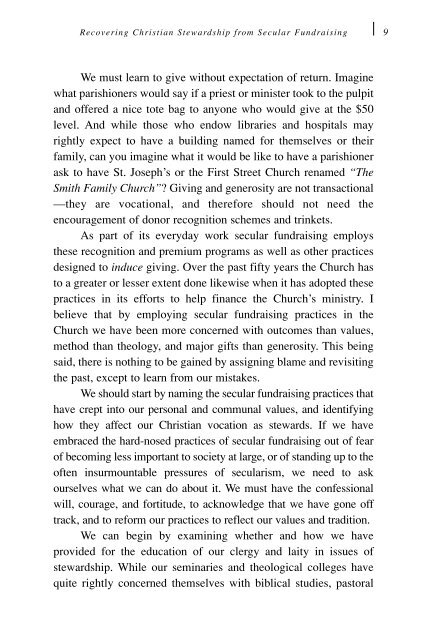Passionate Steward - 10th Anniversary Edition
10th Anniversary Edition of The Passionate Steward - Recovering Christian Stewardship from Secular Fundraising (St. Brigid Press - 2002).
10th Anniversary Edition of The Passionate Steward - Recovering Christian Stewardship from Secular Fundraising (St. Brigid Press - 2002).
Create successful ePaper yourself
Turn your PDF publications into a flip-book with our unique Google optimized e-Paper software.
Recovering Christian <strong>Steward</strong>ship from Secular Fundraising 9<br />
We must learn to give without expectation of return. Imagine<br />
what parishioners would say if a priest or minister took to the pulpit<br />
and offered a nice tote bag to anyone who would give at the $50<br />
level. And while those who endow libraries and hospitals may<br />
rightly expect to have a building named for themselves or their<br />
family, can you imagine what it would be like to have a parishioner<br />
ask to have St. Joseph’s or the First Street Church renamed “The<br />
Smith Family Church”? Giving and generosity are not transactional<br />
—they are vocational, and therefore should not need the<br />
encouragement of donor recognition schemes and trinkets.<br />
As part of its everyday work secular fundraising employs<br />
these recognition and premium programs as well as other practices<br />
designed to induce giving. Over the past fifty years the Church has<br />
to a greater or lesser extent done likewise when it has adopted these<br />
practices in its efforts to help finance the Church’s ministry. I<br />
believe that by employing secular fundraising practices in the<br />
Church we have been more concerned with outcomes than values,<br />
method than theology, and major gifts than generosity. This being<br />
said, there is nothing to be gained by assigning blame and revisiting<br />
the past, except to learn from our mistakes.<br />
We should start by naming the secular fundraising practices that<br />
have crept into our personal and communal values, and identifying<br />
how they affect our Christian vocation as stewards. If we have<br />
embraced the hard-nosed practices of secular fundraising out of fear<br />
of becoming less important to society at large, or of standing up to the<br />
often insurmountable pressures of secularism, we need to ask<br />
ourselves what we can do about it. We must have the confessional<br />
will, courage, and fortitude, to acknowledge that we have gone off<br />
track, and to reform our practices to reflect our values and tradition.<br />
We can begin by examining whether and how we have<br />
provided for the education of our clergy and laity in issues of<br />
stewardship. While our seminaries and theological colleges have<br />
quite rightly concerned themselves with biblical studies, pastoral




